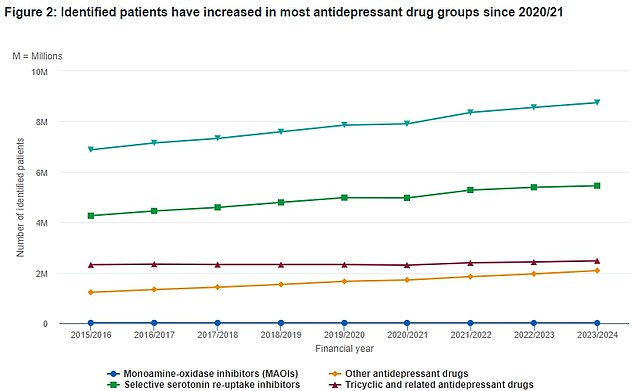Prozac Nation: A record one in SIX people in England are now taking antidepressants, new data shows, with a quarter of the population in some parts of the country taking the drugs
According to official NHS data, one in six people in England are currently taking antidepressants.
Health figures show that a record 8.7 million people in England, around 15 per cent of the total population, are currently taking mood-enhancing drugs.
The number of patients for 2023/2024 is 2.1 percent higher than last year and no less than 26 percent higher than the 6.8 million patients who used medication eight years earlier.
However, the data also shows that the percentage of people using antidepressants is as high as one in four in some parts of the country.
Women aged 55 to 59 formed the largest group of drug users, accounting for about one in twenty of the total.
Health figures show that a record 8.7 million people in England, around 15 per cent of the total population, are now using these mood-enhancing drugs

This NHS data shows the number of Britons who have taken each type of antidepressant over the past eight years. The line with the green triangles shows the total number of patients
This was followed by women aged 50 to 54 and female patients aged 60 to 64.
The vast majority of patients, 5.4 million, were taking a controversial class of antidepressants called selective serotonin reuptake inhibitors (SSRIs).
These drugs, of which Prozac is one of the best known, have raised concerns because of cases of sexual dysfunction in some users, even years after they stopped taking them.
In terms of NHS region, the North East and North Cumbria were the antidepressant capital of England, with 24.5 per cent of the population using the drugs.
This was followed by South Yorkshire (23.4 percent) and Norfolk and Waveney (23.2 percent).
In contrast, NHS organisations in London recorded the lowest percentage of people using antidepressants in England.
In North East London, just over one in ten (11.3 percent) people used antidepressants, the lowest rate in the country.
This was followed by North West London (11.4 percent) and South West London (12.1 percent).
Women in their 50s make up the largest demographic group among Britons using antidepressants.
A total of 561,900 women aged 55 to 59 in England were prescribed these drugs in 2023/2024.
This was followed by women aged 50 to 54 (547,552) and women aged 60 to 64 (499,099).
A similar pattern emerged among men, with men in their 50s most commonly prescribed the drugs, but women made up the vast majority of patients (65 percent).
The data also showed that 11,854 children under the age of 15 were also prescribed antidepressants by the NHS.
Although the vast majority of these (11,186) were children between the ages of 10 and 14, approximately 600 children between the ages of 5 and 10 and 32 children under the age of four were also prescribed the drugs.
NHS data also shows that people in the most deprived parts of England are most likely to take antidepressants.
In total, almost 2.2 million people in the poorest parts of the UK used the drugs, 41.3 per cent more than the number of patients in the richest areas.
Selective serotonin reuptake inhibitors (SSRIs) remain the most commonly prescribed class of antidepressants in the UK, a position that has been maintained for many years.
In the UK, SSRIs are commonly prescribed, including citalopram, fluoxetine and sertraline, sometimes also known by the brand names Cipramil, Prozac and Lustral. However, researchers have linked their use to long-term and even permanent sexual dysfunction.
The NHS warns that side effects such as loss of libido and orgasm, lower sperm count and erectile dysfunction ‘can persist’ after taking the drugs, with patients describing feelings of being ‘broken up’ and relationships being destroyed by their use.
World leaders in psychiatry have previously told MailOnline that ‘people should think very carefully before they even go near it’.
Most doctors and the NHS consider the use of SSRIs for depression, particularly persistent or severe cases, to be useful given the debilitating nature of the condition and the way in which patients can in some cases harm themselves or commit suicide.

Sertraline was recently put in the spotlight by singer Lewis Capaldi, who said he struggled to get an erection while taking the libido-lowering drug

On online forums, some former antidepressant users shared heartbreaking stories of how the loss of their sex lives, even years after they stopped taking the medication, left them feeling suicidal.
The libido-reducing effects of SSRIs were put in the spotlight last year by Scottish singer Lewis Capaldi.
In a Netflix documentary where he deals solely with his anxiety, he talks about the effect it has on his sexual health.
“They don’t really do anything except keep me from getting a hard-on to save my life,” he said.
The libido-reducing effects of SSRIs are so powerful that the drugs, including sertraline, have even been tried in the past on sex offenders to curb their desires.
TikTok users have also flooded social media with their own stories of how their libido disappeared or how they became emotionally numb from using the drugs.
Others joked about how they should quit because it was too high a price to pay for giving up physical pleasure.
However, others who have used the drugs consider them a literal life saver.
The use of antidepressants has increased dramatically in recent years, despite growing concerns among experts about the drugs’ effectiveness in treating depression.
Some studies have even shown that they may increase the risk of heart problems in young people or, paradoxically, even increase the risk of suicide, in addition to problems with sexual well-being.
The research is mixed, however. Other experts point out that such trends may be due to patients suffering from the depression the drugs are supposed to alleviate, rather than the drugs themselves.
And many people who use them claim they work.
It is thought that people with depression have low serotonin levels. However, there is scientific disagreement about this. SSRIs combat this by increasing serotonin levels.
However, some experts suspect that the drugs may cause too much serotonin to be released, with health consequences.
Psychiatrists advise patients who are concerned about the side effects of antidepressants to talk to their doctor about their options.
Sometimes doctors may prescribe an alternative dosage, a different medication, or a different drug to manage the side effects.
They urge patients taking these medications not to stop without first speaking to the medical professional responsible for their treatment so they can get the right support.
The data covers NHS prescriptions for these medicines, ranked by the main reason doctors prescribe them.
However, medications such as antidepressants can also be prescribed for other conditions and these are then included in the data.
These include irritable bowel syndrome (IBS) and pain relief. Sometimes they are also prescribed to treat pain.
Therefore, the data cannot be used to measure the level of depression across the country.
